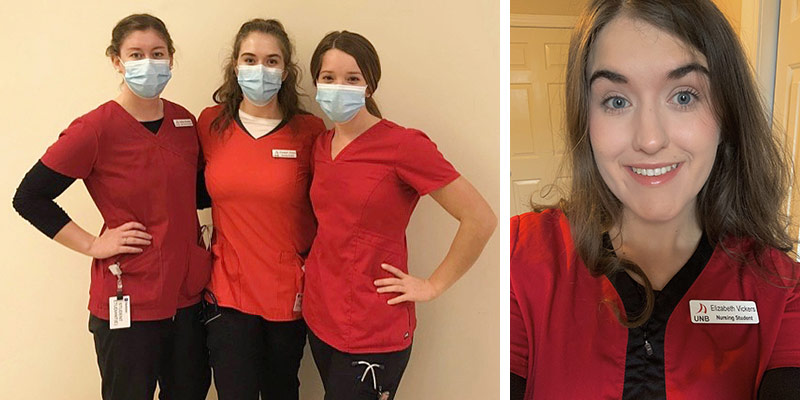Clinical placements set nursing student up for success
Author: UNB Newsroom
Posted on May 11, 2021
Category: UNB Fredericton

During her studies in the bachelor of nursing program at the University of New Brunswick Fredericton, Elizabeth Vickers learned more about being a nurse – and herself as a person – than she ever thought possible.
Vickers, who will graduate in June, has spent the past four years absorbing the theoretical knowledge required to be a nurse and using it to provide care in real-world settings.
“I’m so appreciative of my time at UNB, especially in nursing,” she says. “It helped me grow a lot as a person and showed me a number of diverse clinical experiences.”
From her very first clinical placement in a local nursing home, Vickers learned the essentials of caring for patients. A second clinical experience paired two nursing students with a prenatal couple to provide support and education. It also helped Vickers grow her professional identity.
“Nursing isn’t just in a hospital. It’s so broad. It opened my eyes to the fact that there’s so much I can do with my nursing degree.”
Throughout her placements, Vickers applied the knowledge she learned in the classroom. While completing her mental health clinical rotation, her communication skills grew and showcased the importance of therapeutic relationships with patients.
During her third year, Vickers and her classmates visited a local multicultural centre thrice weekly to provide care and education. Vickers and her peers held a flu shot clinic for about 500 people and, once a week, two students would teach a health topic to newcomer English classes.
“It was a mutual relationship. We were able to learn about multiple cultures and how they view their health, which is essential because we care for people from a variety of cultures and backgrounds,” she says.
Vickers spent much of her fourth year of the program completing experiential learning at the Dr. Everett Chalmers Hospital in Fredericton. Her first semester was on the palliative care unit, where an essential part of the work is caring the family and their needs as well.
The final step in completing the program is a preceptorship placement, where a nursing professional mentors a soon-to-be nursing graduate while providing care to patients. In a preceptorship, students are working on their independence and have a teacher and role model to coach them through their journey – someone who has been in their shoes and can provide insight and encouragement.
By this stage in the program, they have the skills to assist their preceptor. After a short period of job shadowing, Vickers took on a couple patients from their assignment and cared for them independently – within the scope of a fourth-year nursing student. As her placement progressed, and with mentorship and support from her preceptor, Vickers began providing independent care for their full patient assignment. Vickers was comfortable in asking her preceptor whenever she needed assistance.
“We had mutual trust that facilitated such a positive learning environment. You’re learning your professional identity and how to be a nurse and I was certainly granted that many times because I felt trust. Having that person with all that knowledge, all that experience, is just so reassuring,” she says.
Vickers was pleasantly surprised by how much she felt a part of the team. Her skills were utilized and she was encouraged by how much support she received from the entire unit. More importantly, Vickers’ strong relationship with her preceptor has set her up for future success.
“I feel like I now have a colleague and a resource for the rest of my nursing career. Someone I can lean on. So really build a relationship with your preceptor because there’s so much to learn from them.”
UNB is committed to supporting the province by providing our students with experiential learning opportunities that make an impact in their chosen fields while they study. Find more information about becoming a preceptor or clinical instructor with the faculty of nursing.
